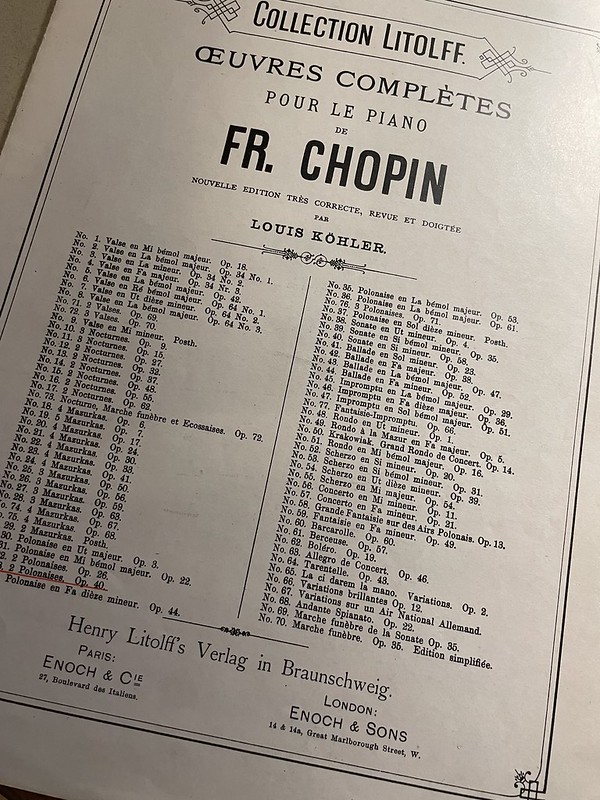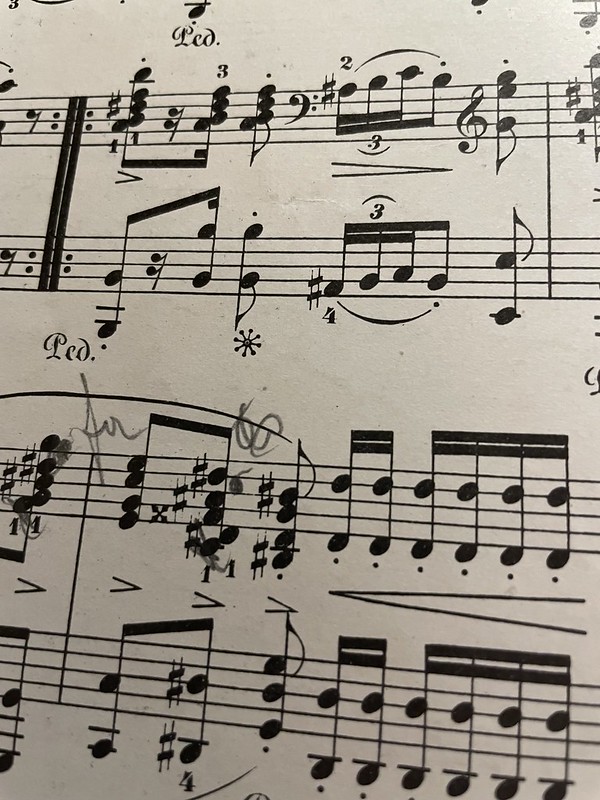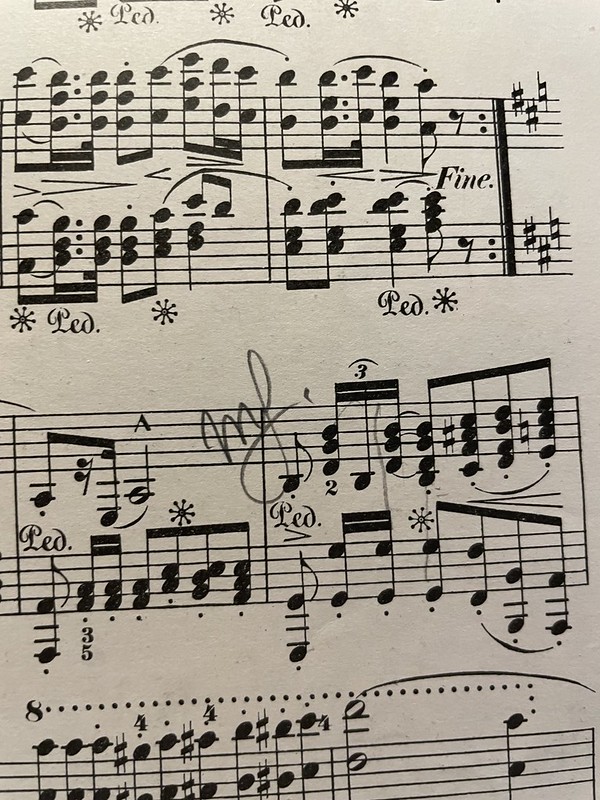I bought this when I was about 15 years old.
That wasn’t today or yesterday. In fact, it was about 35 years ago and I bought it in a music book shop in London. I would give anything to find it again but I suspect it doesn’t exist. In my memory, it was a branch of Oxford University Press but it was, above all other things, a dream world. It had floor to ceiling drawers with mysterious labels. Ladders to get to the higher drawers. Middle aged men having heart attacks as I searched for Rachmaninoff’s name on the drawers.
I wanted two things. This and something else called Grieg’s Piano Concerto. Both of them together were too expensive, so after some no doubt annoying humming and hahing in the shop, I chose Rach. I’m not going to say Rach 2 has always been my favourite piano concerto but I hadn’t heard Saint-Saens 5 by then and Rach 2 is currently my favourite piano concerto.
You can tell this is an old edition. It doesn’t have the standard pic of Rach on the front of which most of the Boosey and Hawkes editions of his concertos do. Also, it is extremely grubby.
I didn’t really realise how grubby it had got until I looked at it today. I took it a lot of places with me. I sat in cars, on rugs, at picnic tables, analysing it, listening to Julius Katchen’s iconic recording and picking out bits of it. We got that from the Great Composers back in the day, on cassette and I recommend it. It’s a tragedy he died so young. The tape lived in my Walkman for most of my teenage years except when I was listening to Jean-Michel Jarre.
One of the girls I knew at choir said the coda was very hard and I would never learn it. She didn’t know it was a coda but the notes were small and there were lots of them. My music teacher did not want to know about it. It’s not like there was an orchestra handy where I grew up. I’m not going to say I was actively discouraged but I definitely was not encouraged.
Looking back, I think this was a pity. Claire Huangci says she learned it at 14. I bet she was encouraged. It’s standard repertoire. There are any number of renditions of it on YouTube. God I would have loved YouTube as a teenager. I just had The Great Composers partworks in cassettes. I learned the opening chords, before I bought the sheet music, from the accompanying magazine. I think my mother donated those magazines. I may regret that now.
I started learning it the summer I was 17. I was doing exams; I had worked my tiny little heart out on chemistry French and maths for two years; I had 2 weeks off before my exams would start and at that point, I didn’t think there was much I could do to improve further my chances in the Leaving Certificate in 1990. I scored two As, 4 Bs and a C back in the day when that meant something (old woman shakes fist at sky about the simplification of the maths syllabus amongst other things) so I probably wasn’t far wrong on that. I knew my theorems and I was the first person in years to do the chemical equilibrium question at my school and I got it 100% correct. I’m not bragging here. I’m about to explain that what I engaged in for the study break was the greatest torture known to a family in Ireland whose piano was in the same room as the TV.
I started learning the second movement of Rach 2. It was in E, a key I preferred to C minor in general (this is still the case). I used to get up, have breakfast, fill a pint glass with Ribena, the sugar filled version, put it on top of the piano, open Rach 2 somewhere in the middle and repeat a few bars endlessly. I must have spent 5 or 6 hours on it on occasion. I have a very fuzzy memory now but I’m certain I had had afternoon practice sessions which lasted 4 hours or more. I cannot imagine the focus I had that allowed me to decipher the notes (sight reading is not my strongest point although it has improved lately), and get myself to a point where I could play around the first – well this is the question. If I look at where I think I stopped, I got about 4 minutes in before I hit the polyrhythms for which I had no help at all and never navigated. But I really didn’t realise it was that far. I almost definitely got about a minute and a half in. There are some notes in the script – not many because mostly I tend to put in things to help to get the rhythm right and after a few years of RIAM and the Leinster School of Music, I have a horror of notes on my script (so I’m totally out of sync with most musicians, it seems) and everything is carefully in by pencil.
Why are we talking about this today? Because I have heard people learning Rach 3 on Reddit and Rach 2 on Tonic and I realised, if they are doing it, why can’t I? I am sure I wrote a bit about some of the people learning Rach 3 and yet I cannot find it quickly. So squirrelled away at the back of my head is that I would pick up the piano concerto again. The same movement – I love it – and start seeing if I could reawaken the memory of what I was able to do when I was 17 years old, drinking Ribena by the pint class. Today, I took it out and looked at how godawful grubby it is. I have the Henle Urtext on my iPad as well but there is some sort of emotional connection between me now (better sight reader and with some tools to deal with polyrhythms) and a girl with a crazy unrealistic dream in a house in the middle of rural Ireland.
I cry tears for that girl sometimes. She had a lot of life before her; I know now what that life included and a lot of it didn’t include a piano which is perhaps a shame.
I can’t still play the first 4 minutes. But I can – almost at will – play the opening page without fault and I can make it sound heart breaking. There is something about I play that which is absent in how I play Mendelssohn, for example. You can pick up senses of it in the Rebikov that I play with affliction when the mood takes me. But the heartbreak in these notes by Rachmaninoff is on a different scale.
I should be learning other exam stuff. I can’t even say how far I will get with this piano concerto this time. It’s mostly way above my skill level when you look at the piece as a whole. But I am now 50, and I can do what I like and what I like at the moment involves pieces of the greatest piece of piano music ever written.




